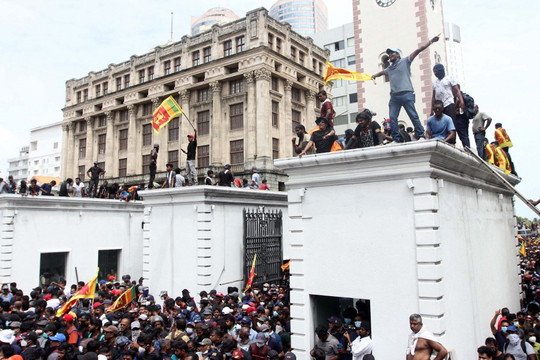A team of television journalists and crew from Sri Lankan news broadcaster Newsfirst, including Sarasi Pieris, Judin Sinthujan, camera operator Warun Sampath, and Janitha Mendis of Newsfirst Digital, were attacked while broadcasting live during coverage of the anti-government protest at the Prime Minister’s residence at 7:20 PM on July 9.
According to Newsfirst, Mendis had informed the security forces of the live coverage on the outlet’s ‘prime time news bulletin’ before the broadcast.
While live on air, officers assaulted the journalists, with footage showing Commanding Officer of the Police Special Task Force SSP, Romesh Liyanage, giving a signal to troops before the attack.
A team of journalists from Newsfirst, including Kalimuttu Chandran, Imesh Sutherland, Chanuka Weerakoon and Banidu Lokuruge, attempted to rescue their colleagues but were also attacked, with security forces firing tear gas.
Several of the media workers suffered serious injuries and were taken to Colombo National Hospital for treatment.
According to police media spokesman, Senior Superintendent Nihal Thalduwa, Colombo’s Inspector General of Police has ordered an immediate investigation into the attacks against the journalists.
The recent protests are some of the largest anti-government demonstrations since March 2022, with protestors demanding the resignation of President Gotabaya Rajapaksa, citing the leadership’s inability to address Sri Lanka’s economic crisis.
On July 8, the Inspector General of Police announced a police curfew to prevent the protests, however, this was overturned. Police and security forces have been documented to be firing tear gas continuously at peaceful protestors gathering outside the president’s residence. The building has since been breached, forcing the president and his aides to flee.
The Sri Lankan government, media, civil society and public intuitions expressed concerns about the attacks. “Freedom of media is paramount to Democracy in Sri Lanka. The Prime Minister requests both the security forces and the protesters to act with restraint to prevent any violence and ensure the safety of the public," the Prime Minister's office said in a statement.
On July 11, the prime minister’s office confirmed that President Rajapaksa, who has not spoken publicly since the storming of his residence, will resign.
Journalists continue to come under fire amid Sri Lankan protests in 2022. On March 31, several journalists were assaulted and at least six were taken into custody by police personnel while covering a protest in Mirihana, within the Nugegoda suburb of Colombo.
The FMM said: “The FMM strongly condemns and deplores the violent assaults on four Sri Lanka’s News first Journalists covering a protest in front of Prime Minister Ranil Wickremesinghe’s residence and six journalists who came to rescue them from police personnel from Sri Lanka’s Special Task Force. FMM calls upon the Inspector General of Police, Police Commission and the Human Rights Commission to investigate and bring to justice the perpetrators responsible for these brutal attacks.”
The SLWJA said: “SLWJA believes that this is not only an assault on journalists but also an assault on people’s right to know information. SLWJA, on several occasions, informed the Inspector General of Police regarding various forms of harassment of journalists and our Association strongly believes that journalists continue to be harassed for failing to act in this regard despite calls for action to prevent a recurrence. Once again SLWJA urges the Inspector General of Police to intervene to enforce the law against those who assaulted journalists without taking their ranks into consideration.”
The IFJ said: “The brutal assaults on journalists and media workers during the Sri Lankan protests are a blatant attempt to quash press freedom and freedom of speech. Journalists must be able to report safely and securely, without fear of harassment or violence. The IFJ urges the Sri Lankan authorities to end the intimidation of journalists and the media and bring the perpetrators of these attacks to justice immediately.”

